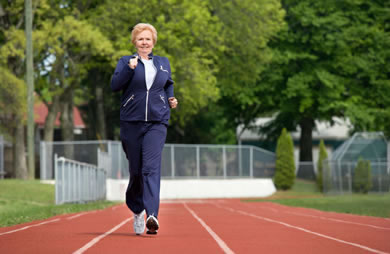|
Editor's Note: Obesity expert Dr. Martin Binks contributes regular guest posts to the dailySpark. Links to products and services contained within do not necessarily imply endorsement by Dr. Binks. All too often both men and women fail to recognize a core issue that interferes with successful weight management: Emotional Eating. We spend our time looking for the next "right" diet plan or the perfect workout to control our weight when in fact the caloric damage from emotional eating accounts for so much of the struggle with weight for many people. Of course balanced and satisfying meals help control REAL hunger, but rarely when eating off plan is true hunger the primary culprit. More often, even if we don’t fully realize it, we are using food to meet some type of emotional need. Now this might be as simple as seeking pleasure and a sense of camaraderie (such as is the case for example at a Super Bowl party or July 4 picnic); however at other times we use food to cope with our baseline stress levels, high stress events, boredom, loneliness, anxiety or sadness rather than to satisfy genuine hunger. We learn this skill very early in life when food is used to soothe, comfort, reward, and console. This learned response becomes more automatic as years progress (as we practice and perfect it) until it happens so automatically we don’t even recognize that we are doing it. Turning to food when you have emotional needs that are not being met becomes part of who we are and it can be very effective. Who hasn’t pulled out the delicious dessert after a bad day at the office and felt better or shared some ice cream with a friend to mourn a break-up. In the case of the break-up, unless you dump your mate every week, who cares about that ice cream, one day every once in a while won’t hurt your health. Unfortunately, if it’s being done every day to cope with daily issues, now THAT IS a problem. So you be the judge. How often is food your emotional enhancer or moderator? If the answer is "often" then we have some ideas below that will help you get off that chocolate-covered emotional roller coaster! Identify the TRUE need Often my clients say they eat out of boredom. If boredom is truly the eating trigger, then eating, while fulfilling the need, is not the best option. Since the true need that is going unfulfilled might be the need for something to do people come up with healthier ideas like: read a book, take a walk, knit, work around the house. These are all perfect matches if the trigger is truly boredom. Sometimes however people misidentify the actual need or true trigger. So in this example after really thinking about it one might realize that the boredom is actually better described as loneliness. In that case none of the activities listed above will fulfill the true need, which is companionship, or at a minimum, contact with other people. Therefore, calling a friend, going out and people watching, or taking a walk to visit some neighbors would be better choices than activities like reading a book or knitting. The better you get at identifying your "true need" in the moment, the better chance you have of identifying the most effective coping strategy to fulfill that need. Practice Emotional Awareness Connect. Take a deep breath and close your eyes. Breathe comfortably, taking gentle and full breaths. Tune in to your body and focus on the sensations you are experiencing. Allow your stomach to rise, and then your chest. Notice the air flowing past the tip of your nose and filling your lungs. Turn your attention to how your body feels in the moment without judging or interpreting. Focus on the moment. Observe. When you are relaxed and feeling in tune with yourself, ask yourself the following kinds of questions: What's going on? What am I sensing? What am I feeling? What am I thinking? Try to do this while maintaining the relaxation generated in the previous step. Evaluate. Continuing in this relaxed state, think about the answers to the questions you have just posed, and based on those answers, try to tune in to your true needs. Keep in mind that you can do this at any time throughout the day. It only takes a moment or two. It is a very useful strategy to break the emotional eating cycle. Handle your emotions now – not later. Some people are labeled as "emotional" or "hypersensitive," while others are described as "stoic" or "emotionless." Neither extreme is ideal. It is important to be able to control and suppress your emotions in the moment if appropriate to do so but not to stuff them forever. Expressing your emotions in the right situation is equally important but may seem strange if you are the stoic one, and similarly holding them back may seem odd if you are the emotional one. Becoming skilled at managing your emotional expression so that you process your emotional experience in real time is a key to eliminating the need for other, less adaptive coping mechanisms (like overeating). Finding healthy outlets is important too; some folks use their close friends or distractions like exercising; others prefer journaling or meditating. All work well. Pinpoint the Trigger In addition to trying to learn as much as you can about your emotional state in the moment, it is important to identify emotional triggers. Think about what triggered your last overeating episode: Was it a specific event or a conflict? A memory? Did you have a distressing thought or series of thoughts? When you pinpoint the trigger, analyze why it had that effect on you and how you might respond to it differently, without resorting to food. Confront the Situation Ask yourself if you really need to eat, then try to figure out what it is you really need. Perhaps it’s a break from your routine or the task at hand. Maybe you need to relax or perhaps you just need to have some fun! If it's something deeper than that, then come to terms with what you need to do to start resolving the situation and plan firm positive actions to begin the process of fixing what’s wrong. If the problem seems too big for you to handle on your own, consider seeking the help of a professional, such as a psychologist or perhaps a qualified therapist or coach (I just happen to know where you might find a very good one at www.DrBinks.com. However you choose to go about it, the important part is to plan the steps you need to take in order to change your relationship with food while working toward developing a healthy and balanced emotional life. It takes practice to identify your true needs and emotional triggers; but as you get better and better at it, you will certainly see and feel the benefits! Are you an emotional eater? Will you try to use these tips and techniques? Dr. Martin Binks is Clinical Director and CEO of Binks Behavioral Health PLLC. He is also Assistant Consulting Professor, Division of Medical Psychology, Department of Psychiatry & Behavioral Sciences, Duke University Medical Center. His professional activities include direct patient care, research, consultation services and the development of evidence-based obesity and health promotion programs for healthcare, research and corporate wellness environments. Dr. Binks received his Ph.D. in clinical psychology from Fairleigh Dickenson University, trained at the Bronx VA Medical Center and completed pre and postdoctoral training in behavioral medicine at the Medical University of South Carolina. He is the former Director of Behavioral Health, Research, and New Business and Strategic Alliances at the Duke Diet & Fitness Center. Dr Binks has worked extensively in the areas of obesity, health & wellness promotion, neuropsychology, substance abuse treatment, post-traumatic stress disorder and spinal cord injury. Dr. Binks has authored and co-authored multiple research publications and the book The Duke Diet and has appeared on MSNBC Countdown with Keith Olberman, ABC news "On Call”, NPR, Lifetime Television, WGN, 700 Club and is a featured contributor on EverydayHealth.com. He is regularly called upon for commentary on a wide range of health and psychological topics in a variety of national publications and websites including USA Today, Washington Post, LA Times, Oprah Magazine, GX Magazine, AOL Health, Fitness, Men’s and Women’s Health Magazines Reuters and the Associated Press. Dr. Binks has been a contributor with the Army National Guard Decade of Health and Wounded Warriors Programs and is a member of several corporate advisory boards. His research interests include technology-based healthcare delivery, obesity treatment, non alcoholic fatty liver disease, and overall health promotion. He serves as a reviewer on several scientific journals Dr. Binks contributes to healthcare provider education through his work with students and trainees and by lecturing nationally in the areas of obesity management, health promotion and behavioral medicine. Dr. Binks is currently active in several leadership positions at the national scientific organization The Obesity Society. Dr. Binks works directly with health coaching clients from around the world through in-person, telephone and web-based technology and also offers individual psychotherapy at the Durham, N.C., location. He can be reached through www.DrBinks.com. |
Popular EntriesMore From SparkPeople |
.jpg)

.png)
.png)



.png)











.jpg)